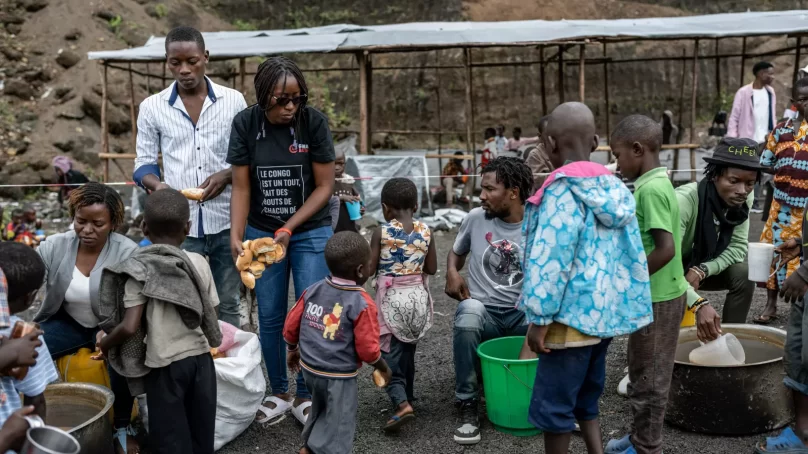
There have been many NGOs in the Democratic Republic of Congo (DRC) for 30 years now, but few can show you the projects they did even 10 years ago.
If you go to a village where a WASH [water, sanitation and hygiene] project has been implemented, often everything disappears after two years, even when millions of dollars were spent there. And that is because communities were not consulted, and sometimes they didn’t even participate.
I joined the Goma Actif collective when the activities of Kanyaruchinya began. I joined the collective through a friend who invited me. But it was during the volcanic eruption, when I sought refuge in Rutshuru with my family that I heard about Goma Actif for the first time. They were carrying out actions for the people affected in Rutshuru. I saw a volunteer friend who I asked to join because I believed that Goma Actif was an organisation that paid its employees.
I did not believe that everything they did was free and that it was volunteering. I myself received assistance from Goma Actif when I was in Rutshuru as a disaster victim. Since the day I joined the collective I have felt useful and good. When we help the children, we prepare food for them and everything. When I don’t come, I don’t feel right. It has become a part of me.
We work with the means we have. We contribute from time to time. Friends and acquaintances who find the idea interesting also contribute and together we give smiles to displaced children and women.
I have been a volunteer with the Goma Actif collective since 2020. I found myself there by invitation from a friend who spoke to me about raising awareness around Covid. When she told me about it, I found the idea important and that is how I joined. On average, we feed at least 800 children a day. We try to do other things regarding health – for example some of us monitor new-borns.
The ideology of the collective is the care of Congolese in dramatic situations in which most people are waiting for an external solution. This care takes an independent form that each Congolese should appropriate.
Goma Actif does not work in a very formal framework like NGOs or associations. Each volunteer takes ownership of Goma Actif, its ideologies and actions. This means that Goma Actif lets each person contribute at their level. It is the contributions of volunteers that allow the Goma Actif collective to function. Everyone contributes at their level: Those who have the time come to prepare the porridge; those who have the money contribute the money.
Sometimes, friends of the diaspora who are in foreign countries and who have understood the meaning and the ideology of Goma Actif contribute. Sometimes we also fundraise online.
I think that many people do not volunteer in Goma because they are desperate. I think that everything I do for this country is because I believe that the Congo can rise. I believe and I hope that the Congo will rise one day thanks to the actions we are taking today.
There are formal organisations that do much appreciated work, unlike NGOs that take time for a famine problem that can be solved in three minutes by buying bread to eat. NGOs have to write terms of references, ask for funds – a lot of things are needed, which slows down the process.
In the meantime, the child who is hungry is dying. But we got active, we don’t need all this procedure. We know the problem, and we solve it in the Congolese way and in an effective way.
“Those who have the time come to prepare the porridge; those who have the money contribute the money.”
NGOs have a lot of means, but a lot of funding ends up on staff. They have to pay expatriates to show people how to wash their hands for example, which for me is super strange.
It is a small thing that should be implemented by small Congolese organisations. We don’t need to pay somebody $5,000 to show people how to wash their hands. NGOs spend a lot of money on staff, while we volunteers focus on helping people in difficulty.
A particular message sent to major donors such as the USA, EU, Japan? Displaced people do not need to be helped with flour and porridge. We do that because we find ourselves in front of that issue. What they need more is to return to their homes, continue doing their work, restart their businesses. They need peace, and they need their life to go back to normal.
Goma Actif continues to do what it can, but the needs are beyond our means. In any case, we would like to help at all levels, but our means are limited. This is a call to all people of goodwill – they can write to us on our Facebook, Instagram and Twitter accounts.
I would like young people elsewhere to organise themselves like Goma Actif and to remain independent like us. For example, in Bukavu (another city in eastern Congo), there could be Bukavu Actif. Whatever the name, this group could respond in an adapted way to the problems people face in Bukavu. In Goma, we make porridge because there is war. But instead of that, in Bukavu, people could come together and clean the town, for example.
We try to set examples – to show people that they should love each other. I hope that this hope for a better Congo will never dim, if we continue to give love. If today we spend hundreds of days in the camp for displaced people, it is because we love this country.
- The New Humanitarian report











